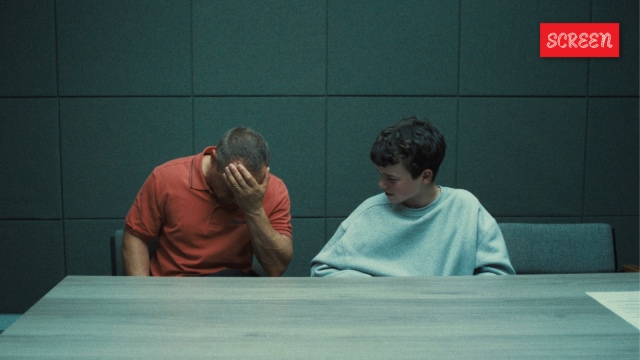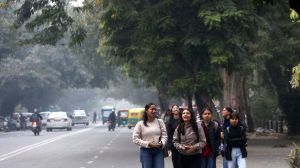Click here to follow Screen Digital on YouTube and stay updated with the latest from the world of cinema.
Netflix’s Adolescence: Mad, brilliant, single-shot monster tore my brain apart
Netflix's Adolescence is a funeral march with no grave—the silence roars, grief’s too big to shout.
 In Netflix's Adolescence, each episode’s its own beast.
In Netflix's Adolescence, each episode’s its own beast.I’m not okay. I finished Adolescence this morning—four episodes, four hours, one giant “what the hell” scream at my ceiling—and I’m still reeling. This beast of a Netflix limited series—with Brad Pitt as one of its executive producers—created by Philip Barantini, Stephen Graham, and Jack Thorne, is a live wire. It’s about a 13-year-old accused of murder, sure, but it’s also about the kids I’ve walked past my whole life, the ones I never really saw. I need to talk about this. Now.
It starts with a bang: Jamie Miller (Owen Cooper, God help us), a scrawny kid with a lost-boy stare, gets hauled out of bed by cops for stabbing a classmate. His dad Eddie (Stephen Graham) flails, his mum Manda (Christine Tremarco) wails, his sister Lisa (Amelie Paese) gawks from the stairs—wide-eyed, forgotten in the storm—and the camera—oh, the camera—never cuts. Single-shot episodes, each one a lunatic feat, prowl through their lives like a predator that won’t heel. The logistics blow my mind—actors, sometimes so many of them that we can’t really count, hitting every mark, crew dodging the frame, all in real time. It’s not flashy; it’s a stranglehold. It’s nuts. It’s genius. I couldn’t look away if I tried.
Each episode’s its own beast.
First is a rabid dog—cops crashing in like a SWAT pack on a rampage, boots thudding, guns drawn, barking orders that rattle the windows. I latched onto Luke Bascombe (Ashley Walters), the detective running this circus—he’s sharp, cool-headed, slicing through the noise with a voice that’s all calm steel. But he’s cracking too—his own son’s a stranger, and there’s this moment he’s stuck with the kid later, hands fidgeting, jaw tight, mumbling half-words that don’t land. He admits to a colleague that he never wanted kids, never signed up for the chaos, and it’s like he’s howling my own dread—I’m not ready either, and I don’t think I ever will be. Those scenes, all awkward silences and “I’m trying” stares while he’s pinning Jamie down, rip me open. British law enforcement’s polish—crisp, kind, almost too smooth—stands a galaxy from India’s mess, where the poor get a slap or a shove, not a steady “let’s talk.”
View this post on Instagram
The second episode is a frantic monkey—Jamie’s school, a tangle of tired teachers and sneering kids. It’s not so different from government schools here—staff stretched thin, chaos reigning—or even high-end ones, where peer pressure and privilege breed bullies. Jamie, and his friends Ryan and Tommy, used to be in the thick of it, but Jamie is gone now—arrested, a ghost in the chatter. Jade, a Black girl, the murdered girl Katie’s friend—often bullied and othered as she admits—lands a punch on Ryan for “killing her friend,” and all those assembled cheer her on. The atmosphere lays the school bare. Violence isn’t a fluke there—it’s the pulse.
Also read | Hansal Mehta ‘devastated’ by Netflix’s Adolescence, calls it an ‘absolute banger’ that deserves every award
My time in school was a breeze: never bullied, even quite popular. There were some remarks here and there about being dark-skinned, but nothing that killed my self-esteem. In the past few years, however, many of my schoolmates, juniors and seniors, men and women, have told me how different school was for them. Some were mocked for not being “man enough,” women with heavier busts were slut-shamed—even by teachers—and others called “flat,” much like how Jamie and his friends referred to Katie. The Kerala teenager, 15, who died by suicide this January—a result of brutal ragging by his peers, according to his mother—comes to mind. I felt sick seeing it play out in this episode. Thirteen Reasons Why—a show some find juvenile—was the last teenage drama that punched me in the gut this way.
The third episode is a coiled snake, fangs bared. Jamie and psychologist Briony (Erin Doherty) square off in a room that’s a trap—bare walls, stale air, just them and the hiss of truth. He’s a live wire, spitting bravado, fishing for her approval like a kid begging for a gold star, but it cracks—his voice wavers, eyes dart, and the scared, angry boy bleeds through. She’s initially warm, trying to win his trust, but turns ice-cold after Jamie’s first outburst—and he has a few of them—probing with questions that slither under his skin. Jamie is still that scared yet smart boy, putting up a show of being confident, almost flirting with Briony, and often lying despite saying he hates doing it. Briony, on the other hand, by the end of the episode, has a reserved breakdown. I felt I saw her seeing in Jamie the shadows of abusive men she’s known, echoes of the boys they were. The episode is tight, mean, written like Criminal—the UK jewel where words draw blood—but this bites harder, coils tighter. Jamie’s feral, a cornered thing thrashing to be seen; Briony is a quiet blade, slicing to the bone. It’s the best damn hour I’ve seen—it left me rattled, chest tight.
The fourth is a wounded elephant—slow, massive, bleeding out. No trumpets, just a family staggering through ash—Eddie, by now, is a husk, shoulders caved, his stares filled with nothingness; Manda’s a shell, her heart heavy yet trying her best to keep things normal; and Lisa, “seen” for the first time, dealing with her life as Jamie’s sister. One of the most brutal moments of the series hits when Jamie, voice flat over a crackling call, tells Eddie that he’s changing his plea, to plead guilty. It’s a sledgehammer. Eddie and Manda claw toward some jagged closure—Eddie’s known his boy killed; he is the only one in the family who has seen the video evidence, but he’s been choking on denial, a shield for himself, for the family, for Jamie’s shrinking shadow. His fists clench, eyes hollow, as he rasps out questions—“Where did parenting snap?” “Was I not a good father?” “Did we not do enough for him?”—his voice a gravel pit of guilt. He didn’t pass down the bruises his own father carved into him, kept that poison locked tight, yet here’s his son, a killer. Manda is a statue beside him, heart split open, knowing this was coming, inevitable as a storm. She’s wrecked, but there’s a flicker—maybe it’s for the best, this truth they can’t dodge anymore. Then, Eddie wails—a ragged, 13-month dam busting loose, pain spilling out in sobs that shake Jamie’s room.
Adolescence is a funeral march with no grave—the silence roars, grief’s too big to shout. No trial, no courtroom drama, just raw, broken quiet, and I love it—lawyers would’ve dulled this ache. Graham’s Eddie, all gruff love and no words, is every dad I’ve met, crushed under a weight he can’t name. It’s heavy, final, and it sits in your gut like lead.
Watch the trailer of Adolescence here:
- 01
- 02
- 03
- 04
- 05


































